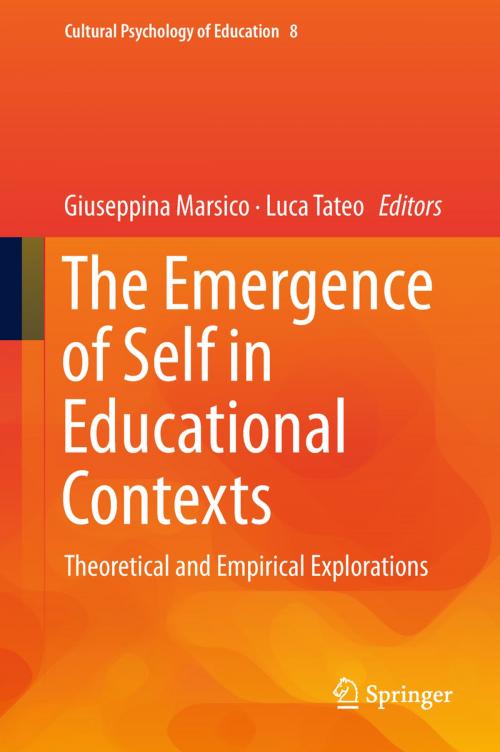The Emergence of Self in Educational Contexts
Theoretical and Empirical Explorations
Nonfiction, Reference & Language, Education & Teaching, Educational Theory, Educational Psychology, Health & Well Being, Psychology, Developmental Psychology| Author: | ISBN: | 9783319986029 | |
| Publisher: | Springer International Publishing | Publication: | September 27, 2018 |
| Imprint: | Springer | Language: | English |
| Author: | |
| ISBN: | 9783319986029 |
| Publisher: | Springer International Publishing |
| Publication: | September 27, 2018 |
| Imprint: | Springer |
| Language: | English |
This book represents the first extensive introduction to the emerging construct of Educational Self. The new concept describes a specific dimension of the Self, which is elaborated in the course of a person’s school life and is reactivated anytime the person is involved in an educational activity, whether as a student, teacher or parent.
The Educational Self (ES) approach was created by the volume editors and is currently being developed at various universities in Europe and Latin America as a way of understanding and operating in educational contexts.
The book presents the theoretical framework and the empirical developments of the construct, paving the way for further applications in education. The main locations of the empirical studies are Denmark, Italy, Brazil, Portugal and Colombia, but the research network is steadily expanding to other countries, so that the concept here can be generalized to different cultural contexts.
The book addresses a range of contexts and moments in school life. The editors’ introduction presents the construct of ES, the opportunities for further theoretical and empirical developments of the concept, and its potential applications in educational practices. In the remainder of the volume, ES is explored for different age groups (from children to adolescents to higher education), different actors (peers, teachers, parents and their interactions), different contexts (formal education, special institutions, school-family relationships) and different phenomena (disruptive behavior, special needs, value orientation, school failure, etc.). All the studies share a qualitative idiographic approach, which is characteristic of the perspective of cultural psychology in which the ES construct was elaborated.
This book represents the first extensive introduction to the emerging construct of Educational Self. The new concept describes a specific dimension of the Self, which is elaborated in the course of a person’s school life and is reactivated anytime the person is involved in an educational activity, whether as a student, teacher or parent.
The Educational Self (ES) approach was created by the volume editors and is currently being developed at various universities in Europe and Latin America as a way of understanding and operating in educational contexts.
The book presents the theoretical framework and the empirical developments of the construct, paving the way for further applications in education. The main locations of the empirical studies are Denmark, Italy, Brazil, Portugal and Colombia, but the research network is steadily expanding to other countries, so that the concept here can be generalized to different cultural contexts.
The book addresses a range of contexts and moments in school life. The editors’ introduction presents the construct of ES, the opportunities for further theoretical and empirical developments of the concept, and its potential applications in educational practices. In the remainder of the volume, ES is explored for different age groups (from children to adolescents to higher education), different actors (peers, teachers, parents and their interactions), different contexts (formal education, special institutions, school-family relationships) and different phenomena (disruptive behavior, special needs, value orientation, school failure, etc.). All the studies share a qualitative idiographic approach, which is characteristic of the perspective of cultural psychology in which the ES construct was elaborated.















